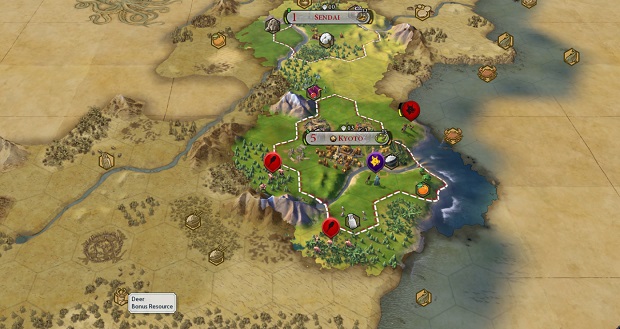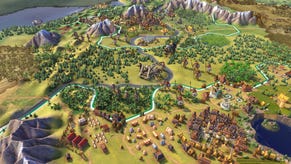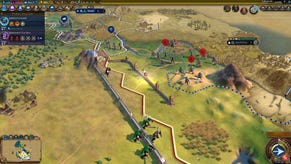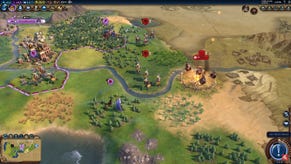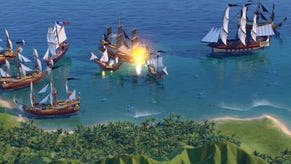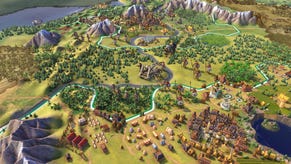Losing My Religion: Civilization VI Diary, Part One
Gotta have faith
In this first part of a Civilization VI [official site] diary series, which will follow my glorious nation from its birth to eventual victory (or abject failure), we trace Japan's steps from the ancient to the classical era. Along the way, I'll be explaining the rules of this new entry in the series as well as telling the story of my people.
Rome is bristling with spears and its leader, Trajan, is not very happy. Not very happy at all. It's 1160 BC and I've already sworn off wonders, stabbed my only friend in the back, and found myself caught between faiths. Let's rewind almost three thousand years though, to the founding of Kyoto and a time of great promise. Let's go back to the start.
I chose to play as Japan for this diary series partly because they build districts quickly, and that's a major new feature I want to experiment with, but mostly because I'm a landlubber at heart and I hoped the Japanese love of coastlines would encourage me to defend my borders at their very edges. I would have been extremely pleased to have my own archipelago to conquer but, unless things change drastically, that's not going to be the case. I'm stuck on a large landmass with a pile of other civilizations and as the classical era dawns, things are about to get ugly.
It wasn't always ugly though, this continent that we call Rodinia. It's a land of milk and spices, of silver and seafood, and there was plenty for everyone to enjoy. Until somebody got greedy. That somebody was me.
That's unusual. Typically, I'm a peaceful player, happy to chase a cultural or scientific victory, and relying on knowledge to defend me against the armies of whatever warmongers exist in the world. So far, and I'm still in the early stages, this hasn't been a typical game of Civ though. That's partly because Civ VI really does force me to change my playstyle in all kinds of interesting ways, but also because I am extremely pissed off about Stonehenge.
It begins here, in a particularly attractive part of the world. As always, this Civ begins with a settler unit and you can choose whether to build a city in the very first turn, or search for a better spot than the one that unit initially occupies. This part of Rodinia looks lush enough to be a happy starting point so I go ahead and build Kyoto right away.
Rodinia, by the way, is the name that the computer has given to my starting continent. It isn't important yet, but there are some rules about continents, mainly defining how the AI deals with them. Discovering a new continent can provide boosts to research as well, thanks to a Eureka moment attached to the associated event.
Eureka moments are one of the main ways in which Civ VI has caused me to change my short-term strategies. Essentially, they're discoveries you can make or actions you can perform that provide half of the research needed to unlock a specific new technology. That tech could be on either of the two research trees – science or civics – and you'll get half of the necessary science or culture points immediately when you achieve the Eureka moment.
It's a feature that read to me like a gimmick. Now that I've played through the game from start to finish several times, I'm sold on it though. The requirements for tech boosts add a new wrinkle to the game, giving you something to pursue in what might otherwise be quiet moments and – crucially – providing a sense of purpose for units that might otherwise by resting between wars. Exploration is rewarding, giving experience directly to reconnaissance units, but also providing a steady steam of tech boosts.
And so I saw those rocks near Kyoto and I knew that building a quarry there was going to be important. I also knew that Stonehenge, already established as one of my favourite ancient wonders in Civ VI, required stone. Wonders are much tricker to chase this time around, as they have strict requirements that might be geographical and related to civic structures rather than simply being unlocked as you travel through the tech tree. That means it's much more sensible and feasible to focus on wonders that suit both your playstyle and the specifics of the map – in this case, Stonehenge would allow me to speed down a religious route, which I hoped would let me dominate my home continent.
The Japanese aren't designed to benefit from religious pursuits in any particular way, but my starting point had enough potential as a provider of spiritual groves and mountain temple retreats that my mind was made up – we'd be god-fearing and later, everyone else would fear our gods as well. Or the swords that we'd engraved pictures of our gods' faces on at the very least.
Stonehenge was the goal then.
I find myself setting these short- and mid-term goals more often in Civ VI than I have in previous games in the series. There's a marvelous flexibility to progress, which encourages detours on the way toward victory. Stall or get lost on one of those detours and you're going to rue the wasted turns though, and in the early game, every turn counts for a lot.
Just as my old mum used to tell me that breakfast is the most important meal of the day, I'm here to remind you that the first few turns of a Civ campaign can be the foundation for everything else. Start poorly and you might fall too far behind to catch up. That's because a game of Civ is essentially about filling up several vessels – you only have to fill any one of those vessels to achieve victory, but concentrating on just that one will lead to disaster. Some balance is required.
As I said in my preview, one of the very many clever things about Civ VI is that the overlap between all of those different vessels has been worked on significantly. Whether you're concentrating on science, culture, religion, wealth, growth, housing, war or any of the several other possibilities (both major and minor), your actions will have an effect across your entire civilization. In this case, my planned pursuit of Stonehenge inadvertently provided me with early advances on the road to masonry, which allowed me to construct crude city walls far earlier than any of my neighbours.
That's a big advantage. Not only are my cities extremely easy to defend – and therefore seriously unattractive to even the most hostile or infuriated of enemies – they can also pick off barbarians from a distance. Cities can attack from range as soon as they have walls and that prevents barbarians from trundling into range and burning all of your improvements.
Those improvements – like so much else in the game – feel much more valuable and important than they have in previous Civs. That's because builders can only create a limited number (three by default) before expiring, making every decision as to what and where to construct much more of a chin-scratcher, but also because the very same tiles you want to improve can be home to wonders and city districts. Drop one of those into place and it'll smash any improvement you've already made so planning ahead and specialising your cities is vital.
The road to Stonehenge required lots of productivity from the citizens of Kyoto. That meant a concentration on civics that supported organisation of the work-force and techs that allowed me to exploit the terrain. Farming and animal husbandry were as important as mining because I'd have to grow the housing and the population in order to harvest the hexes around my city. There's little point in having mines to work if you don't have the miners to work them.
A few scuffles with barbarian encampments, which are actually dangerous and need to be dealt with lest they discover your cities and send the hordes a-pillaging, were the extent of my military engagements. We share the rather large landmass we live on with five other civs, and while there are some I'd rather turn my back on, no fighting broke out in the entire ancient era.
That's miraculous. We have Frederick at the head of the Germans, and he hates anyone who deals with City States, the tiny little versions of Civs that are probably the most-improved feature directly carried over from Civ V. Frederick sees them as his property so if you're grabbing them using armies or dominating them politically, he considers that as almost as bad as having someone step on his property. Fortunately, there are only three states on our big ol' shared residence so he hasn't been too flustered by anyone's attentions toward them.
Then there's Tomyris of the Scythian Empire. She's fairly laidback as long as nobody betrays their chums. Basically, she's happy for people to fight as long as they follow the rules. Since we're a peaceful bunch for the first two thousand years of our existence, she's fairly calm.
Trajan, over in Rome which is located in a horrible coastal desert, likes to own a lot of land and respects anyone else who has a big ol' empire. That should be fine, as I don't have anyone pressing on my borders as we rush toward the classical era and don't feel particularly crowded.
The problem that I can foresee comes with the final two civs in the early equation. Philip of Spain and Mvemba of Kongo, when combined together, create what I'm already referring to as the Philip-Mvemba continuum. They have entirely opposite views to other civs' religions, Philip hating anyone who doesn't follow his faith and spreads their own, and Mvemba seeing any civ that fails to spread its religion into his cities as weak and unworthy.
They can probably form a fairly happy sub-dom relationship left to their own devices, but if I'm going to create the world's first religion using the magic (or at least superstition) of Stonehenge, I'll be on a direct course toward conflict with one of them. That'll most likely be Philip.
And that's why I spend the early portion of the game clearing barbarians out of the areas around Mvemba's cities, once I've cleaned up my own territory. He's going to be my ally once I've managed to spread the joy of my faith throughout his lands and every little bit of assistance will help him to grow stronger.
Stonehenge is six turns from completion when news arrives that some unknown bastard elsewhere in the world has already built it. My stone circle is now just a circle of dirt, this visual reminder left on the map like a big “FUCK YOU” from the shiny new visual design of Civ that can be seen from space.
So much for my first short-term goal. All of my energies had been directed toward improving my capital so that I could rush toward Stonehenge and an early religious experience, to the extent that my one other city had been somewhat neglected. Trying to see a bright side to this calamity, I cast my eyes to my treasury. Remember how I said Civ is about filling up vessels? Turns out while the well of religion might be looking rather dry, there's a lot of gold in my coffers.
I buy two settlers straight away, knowing there's a natural wonder that I can plant a city by to the north for some massive buffs to productivity of all kinds. With the other settler I'll construct my first coastal city and head off to sea so that I can find the prick who built Stonehenge and get my revenge. It's probably China, the only civ with the ability to rush wonders using builders.
A few turns later, as my settlers head off to their chosen sites with military escorts in tow, I spy a Roman settler heading toward one of those same sites. He's going to reach it first and it's right by the natural wonder, which I really want to build a tourist park on in a few thousand years time.
And that's when I plunge into the classical era with a sharpened sword and a warcry on my lips. Surprise wars carry a much smaller penalty in the early game – civilization was so much less civilized back then after all – which makes an unescorted settler a much easier target than it might be if stealing it was going to put a black mark against your name for the rest of recorded time.
That's how I justified stealing Trajan's settler. I'd jump from two cities to five cities in a few turns and given his proclivity toward people with large tracts of land, he might be so impressed that he'd forgive me before the turn of the next millennium. Of course, Tomyris was pissed off as well, being the kind of leader who hates backstabbing. There was no declaration of war but she let me know exactly how unimpressed she was.
And I'm no closer to founding a religion. Maybe that means I'm going to embrace a new destiny and build the most culturally advanced cities in the world using the Japanese bonus toward district construction.
As the new era begins, my entire focus has changed. I'll fight the Romans on their crappy desert beaches and I'll ignore the Philip-Mvemba continuum for now – my future is in the five cities that will form the organs of an empire. One devoted to science, one devoted to culture, one devoted to faith, and two to provide whatever the others might need.
I might not be able to fill every vessel of my civilization, but as the age of the Japanese republic dawned, I was going to give it a damn good shot.
To be continued, soon. For a more detailed judgement of the game, look here.




